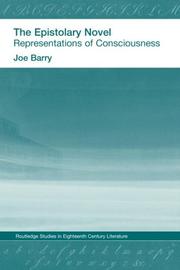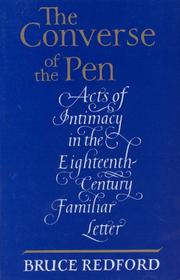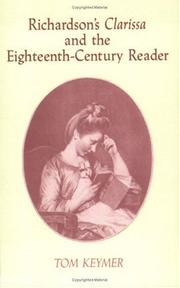| Listing 1 - 5 of 5 |
Sort by
|
Book

ISBN: 2226008659 9782226008657 Year: 1979 Publisher: Paris Albin Michel
Abstract | Keywords | Export | Availability | Bookmark
 Loading...
Loading...Choose an application
- Reference Manager
- EndNote
- RefWorks (Direct export to RefWorks)
Bibliotheek François Vercammen
Communists --- Letters --- Communistes --- Lettres (Genre littéraire) --- Marx, Karl, --- Correspondence --- -820-6 MARX, ELEANOR --- 820-6 MARX, JENNY --- 820-6 MARX, LAURA --- Communism --- Lettres (Genre littéraire) --- 820-6 MARX, ELEANOR --- Communists - Correspondence

ISBN: 0415306108 0203351517 1134402546 1138008729 020313057X 1280546999 9780203130575 9780415306102 9786610546992 6610546991 9781138008724 9781280546990 9781134402540 Year: 2003 Volume: 1 Publisher: London Routledge
Abstract | Keywords | Export | Availability | Bookmark
 Loading...
Loading...Choose an application
- Reference Manager
- EndNote
- RefWorks (Direct export to RefWorks)
The epistolary novel is a form which has been neglected in most accounts of the development of the novel. This book argues that the way that the eighteenth-century epistolary novel represented consciousness had a significant influence on the later novel. Critics have drawn a distinction between the self at the time of writing and the self at the time at which events or emotions were experienced. This book demonstrates that the tensions within consciousness are the result of a continual interaction between the two selves of the letter-writer and charts the oscillation between these two selv
Bewustzijn in de literatuur --- Conscience (Psychophysiologie et philosophie) dans la littérature --- Consciousness in literature --- 820 "17" --- 820-6 --- 820-6 Engelse literatuur: brief --- Engelse literatuur: brief --- 820 "17" Engelse literatuur--18e eeuw. Periode 1700-1799 --- Engelse literatuur--18e eeuw. Periode 1700-1799 --- English fiction --- Epistolary fiction, English --- History and criticism --- Epistolary fiction [English ] --- 18th century --- Consciousness in literature. --- History and criticism.

ISBN: 0226706796 Year: 1986
Abstract | Keywords | Export | Availability | Bookmark
 Loading...
Loading...Choose an application
- Reference Manager
- EndNote
- RefWorks (Direct export to RefWorks)
Intimacy (Psychology) in literature --- Intimiteit (Psychologie) in de literatuur --- Intimité (Psychologie) dans la littérature --- 820-6 --- Engelse literatuur: brief --- 820-6 Engelse literatuur: brief --- Authors, English --- Conversation in literature --- Conversation --- English letters --- English prose literature --- Friendship --- Letter writing --- Correspondence --- English letter writing --- Letter writing, English --- Writing of letters --- Authorship --- Letters --- Affection --- Friendliness --- Conduct of life --- Interpersonal relations --- Love --- Talking --- Colloquial language --- Etiquette --- Oral communication --- English authors --- Correspondence&delete& --- History and criticism --- History --- Psychological aspects --- 18th century --- Authors [English ] --- Great Britain
Book
ISBN: 3406081339 9783406081330 Year: 1981 Publisher: München Beck
Abstract | Keywords | Export | Availability | Bookmark
 Loading...
Loading...Choose an application
- Reference Manager
- EndNote
- RefWorks (Direct export to RefWorks)
Marx, Karl --- Communists --- Philosophers --- Correspondence --- Biography --- Marx, Karl, --- -Communists --- -Philosophers --- -929 MARX, KARL --- 820-6 MARX, KARL --- 830-6 MARX, KARL --- Scholars --- Communism --- Marx, Karl. --- 929 MARX, KARL --- Makesi, --- Ma-kʻo-ssu, --- 马克思, --- 馬克思, --- Marukusu, --- マルクス, --- Marx, Heinrich Karl, --- Marks, Karl, --- Marx, Carlos, --- Marks, K. --- Marŭkʻŭsŭ, Kʻal, --- 마르크스, 칼, --- Marksŭ, --- 맑스, --- Marks, Karol, --- Mác, Các, --- Marx, Karel, --- Marksas, Karolis, --- Marx, Carlo, --- Mác, C., --- מארכס, --- מארכס, קארל, --- מארכס, קרל, --- מארכס, ק --- מארקס --- מארקס, קארל --- מארקס, קארל, --- מארקס, קרל, --- מארקס, ק. --- מרכס, קרל --- מרכס, קרל, --- ماركس، كارل --- ماركس، كارل، --- Markso, Karlo, --- Communists - Correspondence --- Communists - Biography --- Philosophers - Germany - Correspondence --- Marx, Karl, - 1818-1883

ISBN: 0521604400 0521390230 1139085999 0511553498 Year: 2004 Publisher: Cambridge Cambridge University press
Abstract | Keywords | Export | Availability | Bookmark
 Loading...
Loading...Choose an application
- Reference Manager
- EndNote
- RefWorks (Direct export to RefWorks)
Written as a collection of letters in which very different accounts of the action are unsupervised by sustained authorial comment, Richardson's novel Clarissa offers an extreme example of the capacity of narrative to give the reader final responsibility for resolving or construing meaning. It is paradoxical then that its author was a writer committed to avowedly didactic goals. Tom Keymer counters the tendency of recent critics to suggest that Clarissa's textual indeterminacy defeats these goals by arguing that Richardson pursues subtler and more generous means of educating his readers by making them 'if not Authors, Carvers' of the text. Discussing Richardson's use of the epistolary form throughout his career, Keymer goes on to focus in detail on the three instalments in which Clarissa was first published, drawing on the documented responses of its first readers to illuminate his technique as a writer and set the novel in its contemporary ethical, political and ideological context.
820 "17" RICHARDSON, SAMUEL --- 820-6 --- 82:396 --- 82.085.43 --- 028 --- Authors and readers --- -Reader-response criticism --- Books and reading --- -Epistolary fiction, English --- -Women and literature --- -Literature --- Appraisal of books --- Books --- Choice of books --- Evaluation of literature --- Literature --- Reading, Choice of --- Reading and books --- Reading habits --- Reading public --- Reading --- Reading interests --- Reading promotion --- Reader-oriented criticism --- Reception aesthetics --- Criticism --- Readers and authors --- Authorship --- 028 Lezen. Lectuur --- Lezen. Lectuur --- 82.085.43 Literaire receptie --- Literaire receptie --- 82:396 Literatuur en feminisme --- Literatuur en feminisme --- 820-6 Engelse literatuur: brief --- Engelse literatuur: brief --- English epistolary fiction --- English fiction --- 820 "17" RICHARDSON, SAMUEL Engelse literatuur--18e eeuw. Periode 1700-1799--RICHARDSON, SAMUEL --- Engelse literatuur--18e eeuw. Periode 1700-1799--RICHARDSON, SAMUEL --- History --- -History --- -History and criticism --- -Appraisal --- Evaluation --- Richardson, Samuel --- Richardson, S. --- -Reader-oriented criticism --- -English fiction --- -English epistolary fiction --- Arts and Humanities --- Women and literature --- Epistolary fiction, English --- Rape victims in literature. --- Reader-response criticism. --- History and criticism. --- Richardson, Samuel, --- Rape victims in literature --- Reader-response criticism --- History and criticism --- Appraisal --- -Richardson, Samuel
| Listing 1 - 5 of 5 |
Sort by
|

 Search
Search Feedback
Feedback About UniCat
About UniCat  Help
Help News
News